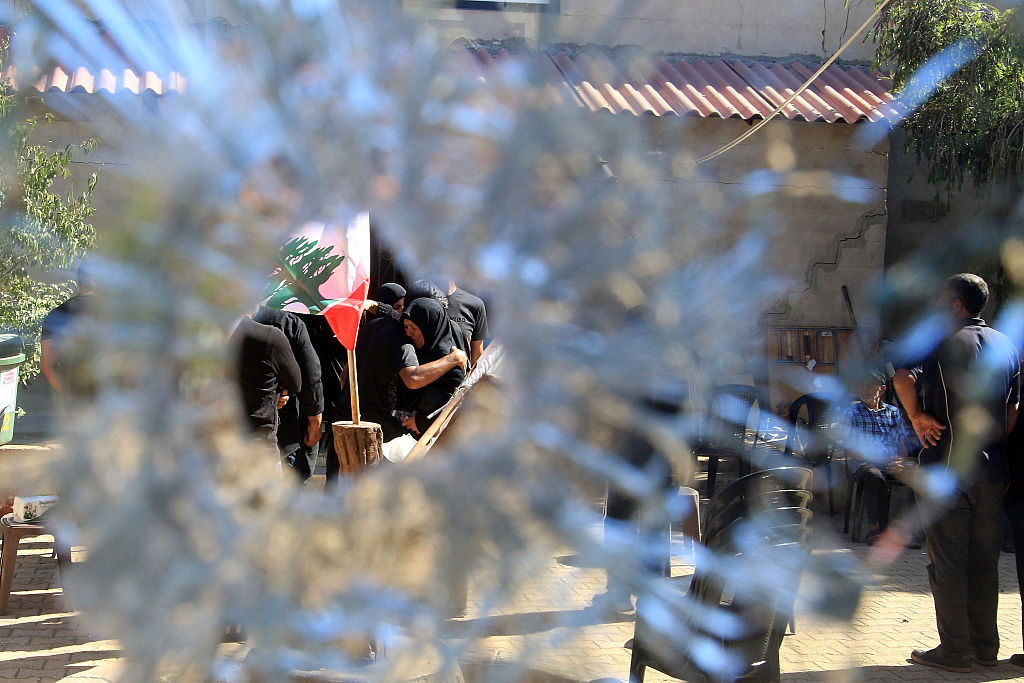It is with a heavy heart and a nice calming feeling that I find myself agreeing with Rashida Tlaib. Tlaib claims to get a ‘calming feeling’ every time she thinks about how the Arabs of British-controlled Palestine gave Jews a ‘safe haven’ after World War Two. This remark has elicited accusations of anti-Semitism and disbelief from President Trump, prominent House Republicans Steve Scalise and Liz Cheney, and a host of reality-based historians. But Tlaib is right, in this if little else, to protest that her words were not anti-Semitic.
Tlaib’s words were merely inaccurate, deceptive, and entirely in accord with her campaign to delegitimize American support for Israel, demonize the Jewish state, isolate American Jews through allegations of ‘dual loyalty’, whitewash Palestinian terrorism, and generally distract our attention from the facts.
These are present facts, like Tlaib’s fondness for the company of Islamists and apologists for terrorism, or her dubious uniqueness as the only member of Congress who wishes to destroy the Jewish state. They are also historical facts about the Palestinian Arab alliance with Nazi Germany, about pre-1939 Palestinian Arab attempts to nullify the Israeli state-in-the-making by murdering Jewish civilians, about the unceasing Palestinian Arab campaign of murder since 1945 — and about the related propaganda effort, in which Tlaib clearly shares, to erase the Jewish people from history, even though they were ‘Palestinian’ when Christianity was just starting out.
So while Tlaib’s version of the past is not inherently anti-Semitic, it emerges from a consistently ahistorical view of the creation of the modern Israeli and Palestinian peoples, often carrying profoundly anti-Semitic overtones. The Arab leaders in the British Mandate were always opposed to Jewish immigration into the Land of Israel. So, judging from the violence of their response, were most of the Arabs whose descendants became modern Palestinians while the other modern Palestinians, the Jews of the British Mandate, became Israelis.
You can see why the Arabs of the Mandate felt that way. You can even see why it was in their collective interest to do everything they could to block Jewish immigration; as Tlaib also said last Friday, their collective future was at stake. Such are the ways in which historical facts combine into historical complexities. Current complexities cannot be resolved without accurate understanding of a shared past. These complexities, and the challenges of resolution, are complex enough without Rashida Tlaib making up nonsense about Arabs willingly offering a ‘safe haven’ to Jews.
The truth is that in the 1920s, the first Palestinian leader, Haj Amin al-Husseini, did his utmost to block Jewish prayer rights at the Western Wall, and incited riots against Jewish civilians. In the 1930s, al-Husseini, an enthusiastic ally of Nazi Germany, also successfully pressured the British government to close the Mandate’s territory to Jewish refugees from Europe. During World War Two, al-Husseini recruited Bosnian Muslims into the SS, and broadcast calls for the extermination of the Jews on Radio Berlin. In 1943, after 4,000 Jewish refugee children and 500 adults had managed to reach the Mandate, al-Husseini intervened with German authorities to prevent further immigration.
After the war, the Arab League appointed al-Husseini the leader of the Arab Higher Executive, which it had created to represent Palestinian rejection of not just Jewish statehood, but also the immigration of Jewish survivors of the Holocaust. There is no evidence to suggest that the Arabs of the Mandate willingly gave ‘safe haven’ to Jewish refugees, and a mountain of evidence to suggest that they did their utmost to prevent the establishment of Jewish statehood, including by preventing the growth of the Mandate’s Jewish population.
Whether or not you sympathize with the Arabs of the Mandate and their descendants, Rashida Tlaib is misrepresenting the past for present ends. Perhaps, as Donald Trump suggests, she is motivated by ‘tremendous hatred of Israel and the Jewish people’. Perhaps Tlaib knows that most Americans would be revolted by the truth about the squalid conduct of the Palestinian leadership before, during and after World War Two. Perhaps she is ignorant beyond the ordinary requirements of Congress. But why are Nancy Pelosi and Bernie Sanders taking Tlaib’s side?
Pelosi denounces objection to Tlaib’s statements as a ‘smear’. Sanders accuses Trump of ‘ugly attacks against Muslim women in Congress’. But the smear and the ugliness here are in Tlaib’s falsification of the past in order to advance what she euphemistically calls the ‘one-state solution’ — not the one-state solution of Israeli annexationists, but the one-state solution that would surely lead, in historical phrases that Haj Amin would have recognized, to a final solution to the ‘Jewish question’.
As the Ilhan Omar drama shows, Democratic leaders are so afraid of their base that they are Corbynizing themselves. That might be a moral peril, and it might hamper the next Democratic presidential candidate, but it’s a smart strategy for fringe representatives like Tlaib. The Balkanizing of American politics — two states for two peoples, red and blue — has produced a Congressional map as gerrymandered as Israel’s zoning laws in East Jerusalem. Tlaib’s honest admission of a dishonest position is unlikely to damage her standing in her sapphire-blue Michigan district. It might even strengthen it.
The Cook Political Report rates Tlaib’s constituency ‘D +32’. This means that a generic Democrat has a 32-point head start on a generic Republican. Tlaib isn’t afraid of the GOP. If anything, she’s more worried about a primary challenge. Burnishing her credentials against what she calls ‘right-wing Zionists and the GOP’ bolsters her against that challenge. That’s as close to a safe haven as it gets.
So Tlaib is here to stay. This is bad news for Nancy Pelosi, for the inheritor of the Speaker’s poisoned chalice next summer, and for centrist Democrats. The second half of President Obama’s first term saw the launch of the Tea Party. It also saw the defeat of the notoriously moderate Mitt Romney. Now, Tlaib’s radical rump is emerging in the second half of President’s Trump’s first term. If he wants a second term, the noisy presence of Democratic radicals is just what Trump needs if he is to remind voters what he’s not.
Rashida Tlaib may get a ‘calming feeling’ when she talks nonsense in the knowledge that it will cost her nothing. But the feeling of her party’s leaders looks closer to panic. And if they render themselves hostage to their lunatic fringe, the feeling they get in 2020 may be closer to despair.
Dominic Green is Life & Arts Editor of Spectator USA.

























